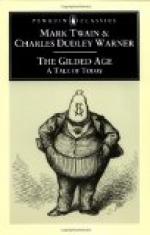The Hon. Mrs. Higgins was a picturesque woman, and a fluent talker, and she held a tolerably high station among the Parvenus. Her English was fair enough, as a general thing—though, being of New York origin, she had the fashion peculiar to many natives of that city of pronouncing saw and law as if they were spelt sawr and lawr.
Petroleum was the agent that had suddenly transformed the Gashlys from modest hard-working country village folk into “loud” aristocrats and ornaments of the city.
The Hon. Patrique Oreille was a wealthy Frenchman from Cork. Not that he was wealthy when he first came from Cork, but just the reverse. When he first landed in New York with his wife, he had only halted at Castle Garden for a few minutes to receive and exhibit papers showing that he had resided in this country two years—and then he voted the democratic ticket and went up town to hunt a house. He found one and then went to work as assistant to an architect and builder, carrying a hod all day and studying politics evenings. Industry and economy soon enabled him to start a low rum shop in a foul locality, and this gave him political influence. In our country it is always our first care to see that our people have the opportunity of voting for their choice of men to represent and govern them—we do not permit our great officials to appoint the little officials. We prefer to have so tremendous a power as that in our own hands. We hold it safest to elect our judges and everybody else. In our cities, the ward meetings elect delegates to the nominating conventions and instruct them whom to nominate. The publicans and their retainers rule the ward meetings (for every body else hates the worry of politics and stays at home); the delegates from the ward meetings organize as a nominating convention and make up a list of candidates—one convention offering a democratic and another a republican list of incorruptibles; and then the great meek public come forward at the proper time and make unhampered choice and bless Heaven that they live in a free land where no form of despotism can ever intrude.
Patrick O’Riley (as his name then stood) created friends and influence very, fast, for he was always on hand at the police courts to give straw bail for his customers or establish an alibi for them in case they had been beating anybody to death on his premises. Consequently he presently became a political leader, and was elected to a petty office under the city government. Out of a meager salary he soon saved money enough to open quite a stylish liquor saloon higher up town, with a faro bank attached and plenty of capital to conduct it with. This gave him fame and great respectability. The position of alderman was forced upon him, and it was just the same as presenting him a gold mine. He had fine horses and carriages, now, and closed up his whiskey mill.




